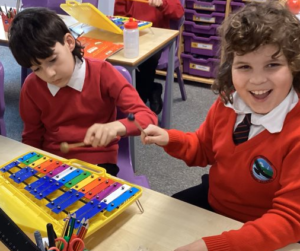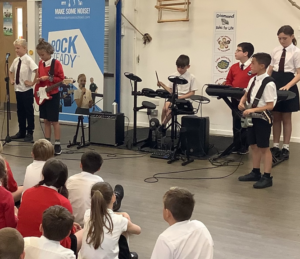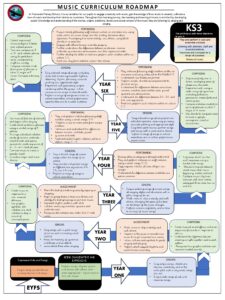Music
‘Music gives a soul to the universe, wings to the mind, flight to the imagination and life to everything.’
Plato
‘So long as the human spirit thrives on this planet, music in some living form will accompany and sustain it.’
Aaron Copland
Curriculum Roadmap
Intent
Our ambitious music curriculum provides the opportunity for our pupils to engage creatively with music; gain knowledge of how music is created, nurtures a love of music and develop their talents as musicians.
Music reflects our culture and society; the teaching and learning of music enables children to better understand the world they live in. Where we can, we make a point of recognising and celebrating Cornwall’s rich musical heritage.
The history of music is explored in a variety of ways, placing music in artistic historical, social and political contexts and builds meaningful and memorable connections.
We are committed to ensuring the effective delivery of a music curriculum that is accessible to all our children. Music is a unique way of communicating that can inspire and motivate children. At Treloweth, music brings our school community together through the shared experience of whole-school singing and classroom ensemble playing. Children have the opportunity to experiment with the creative process and perform their compositions. The effective delivery of music builds musical confidence through active engagement with music as performance, music creators and audience.
Implementation
The teaching of music at our school is supported by structured plans that draw upon the national Model Music Curriculum. This approach enables a progression of skills, ensuring that students engage with music in a way that builds confidence, aural skills, and creativity over time. The curriculum’s small-step methodology provides teachers with a broad range of activities that nurture children’s enjoyment of music, refine individual tastes, and foster their abilities as expressive musicians.
Cross-curricular links are strategically incorporated, connecting musical learning to wider educational themes and enhancing students’ understanding of musical culture, both locally and globally. Students learn to use their voices expressively, sing diverse songs, play untuned instruments, and develop appraisal skills across varied genres and cultural traditions. Singing and performing are integral components, with frequent opportunities for students to showcase their skills at school events.
As children progress through the school, they are introduced to a variety of genres, including pop, rock, gospel, and jazz, as seen in units like “Livin’ on a Prayer” and “Lean on Me” in upper key stage 2. Activities such as composing, improvising, and playing instruments like ukuleles and samba drums support their musical growth and practical application. Additional music experiences include live performances, participation in Samba, Ukulele, Recorder, and Choir programs led by local musicians, reinforcing our commitment to cultivating musical skills in line with the Model Music Curriculum framework.
At a glance
• National curriculum guiding principles inform year group subject mapping documents
• Music is mapped across year groups in small sequential steps and end points identified (to know, do and experience)
• Treloweth ½ term Progression Documents plot sequential small steps
• Classes have a weekly lesson
• Lessons activate prior knowledge, introduce, use and apply specific vocabulary, listen and appraise reactivates memory, hinge questions/show me is used to assess understanding of small steps towards end points
• Charanga scheme of work supports teaching, YouTube/virtual platforms and County Music Service offer tuition
• Information for parents can be found in ½ term overviews
• Children also sing and make music in assemblies, festivals and performances
• Examples can be found on class website pages and newsletters
• Links to other subjects include: geography, art, history, maths, English
Please click on the Pdf below for more information:




